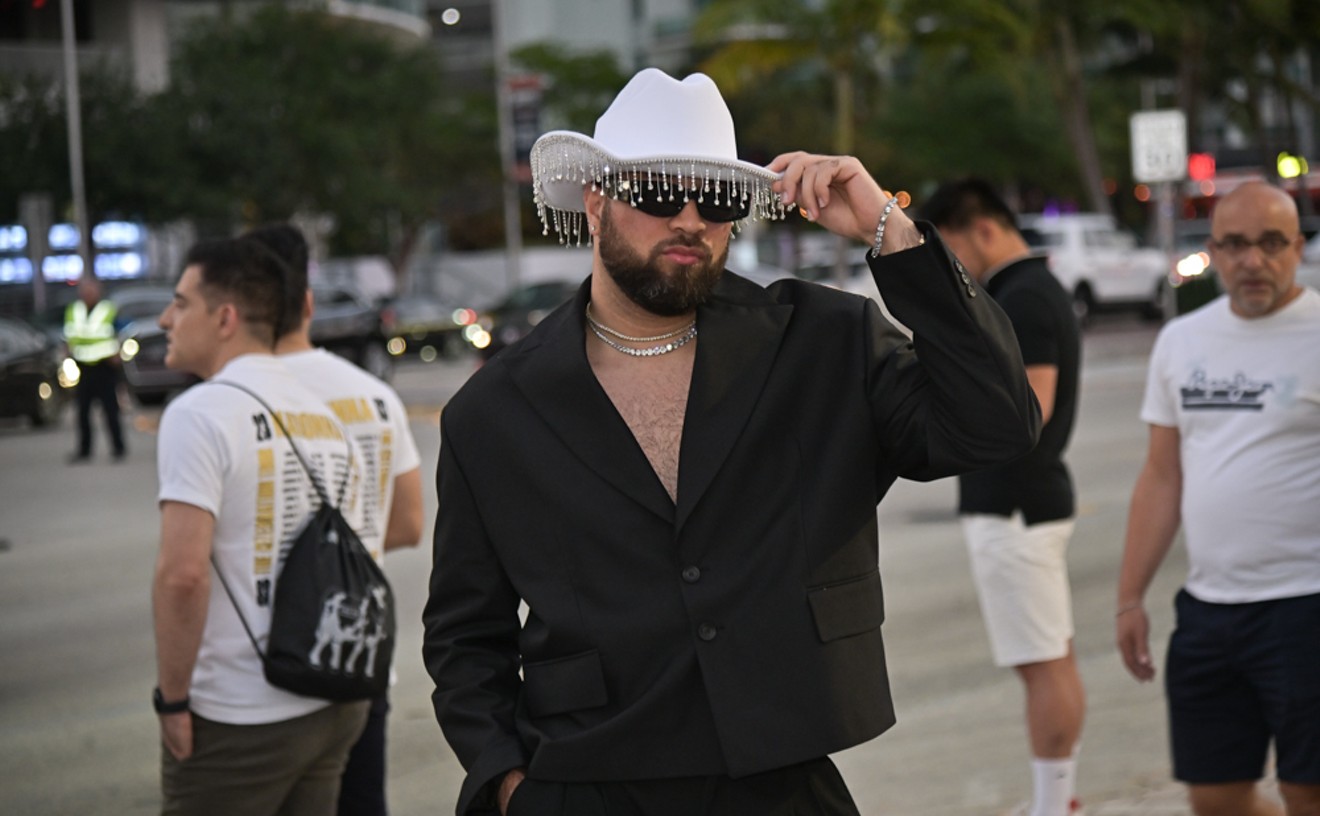Asked for his version of events via cell phone while riding on a tour bus headed to the first show of his Mr. Moonlight tour in San Antonio, Texas, Murphy responds, "I can't talk about that. The court case is going to happen soon."
See also:
-Bauhaus' Peter Murphy Arrested for DUI and Meth Possession
-Peter Murphy: "Bauhaus Was the Seminal Moment in That Time, Joy Division Was Not"
-Review: Peter Murphy and the Music of Bauhaus in Miami, April 30
After entering a not-guilty plea, a judge released him on his own recognizance on the condition that he does not get behind the wheel of a car. His court appearance has been scheduled for May 17. "You'll still hear the truth of it once the court case is heard," Murphy adds.
With that unsavory bit of rubber-necking out of the way, the 55-year-old Murphy opened up about the early days of Bauhaus and what a strange, incongruous sort of band he had created with guitarist Daniel Ash and brothers David J on bass and Kevin Haskins on drums. As he starts a tour playinf only Bauhaus music, Murphy seems eager to consider the band's place in modern music's history.
It was the end of the 1970s, and the British music scene was in the middle of a renaissance. Punk rock had outlived its novelty, and genres like new romanticism, goth, and twee were far from the lexicon of music journalism. It was all postpunk.
"They called us postpunks, but we were archigans," Murphy says in an allusion to the band's interest in the archaic. "Bauhaus were archigans, or I was an archigan. I was never a punk. I was never a postpunk. I was already formed. I would say I was a dandy poet, appreciating the romantic but not at all new romantic."
Murphy speaks for himself when he talks about the influences he brought to the band. "Kraftwerk were among my influences, very early on," he says, "and of course, early [David] Bowie. I was very much into [Brian] Eno's stuff, very early Eno work, the ambient stuff, Taking Tiger Mountain, seminal works that really informed music. This is my school, really. This is where I'm from."
He can speak only for his influences, however, and notes the magic among the four souls of Bauhaus comes from an almost surreal level of trust among them. "Once we got in [the studio], we were inspired by each other," he says. "We dropped everything. We left everything out. You don't walk in there with any baggage. You walk in with each other.
"You inspire each other, viscerally. You do it as you play, not with words. Less talking, more creating. The moment the members of Bauhaus, particularly the members of that band, started to exchange and intellectualize, that was the point at which it would fall apart, because we're not very friendly to each other."
The result included driving songs like "Dark Entries" and "In the Flat Field," propelled by a restless rhythm section and guitar feedback while Murphy breathlessly spewed his lyrics. It was opulent yet gritty. But there were also the subdued moments like the stark and spare "Bela Lugosi's Dead."
Murphy says it all came from ideas and improvisation that tapped into a primal force. "We wrote half our first album in two days, and one week later, I was in the studio, and my first-ever vocal in one take was 'Bela Lugosi's Dead' and then 'Dark Entries.' It was very much a realization of my own nature."
And if there's one song most associated with Bauhaus, it is "Bela Lugosi's Dead." From its debut as the band's first demo to Bauhaus' appearance performing it during the opening credits of the 1983 David Bowie/Catherine Deneuve modern vampire flick The Hunger, the song has acquired a mythic aura.
"It comes from a beautiful, anthemic, hymn-like Gregorian kind of dirge we started to jam, and we also talked about it," Murphy explains. "We talked about the notion of the eroticism of the ego of the vampire in culture and history. Not from a latter-day, what is now, a very sort of Addams Family, really bad, cheap goth sort of idea. It was not at all that ever in our minds. We were never that. We were the masters of just culture, of art and that kind of expressiveness of the erotic."
Plus, the former Bauhaus frontman adds: "Dracula is the ultimate star, isn't he? He's the ultimate leading man. He's the ultimate male seducer. It was a very smart, very intelligent play on that, and in that sense, rather than choose some serious actor who played him, we chose the most kitsch name like Bela Lugosi as a kind of counterpoint to that. So it was very, very cool."
Peter Murphy's Mr. Moonlight Tour. Performing the music of Bauhaus. With My Jerusalem. Tuesday, April 30. Grand Central, 697 N. Miami Ave., Miami. The show starts at 7 p.m., and tickets cost $28 to $60 plus fees via ticketfly.com. Call 305-377-2277, or visit grandcentralmiami.com.
Follow Crossfade on Facebook and Twitter @Crossfade_SFL.
Follow Hans Morgenstern on Twitter @indieethos.











